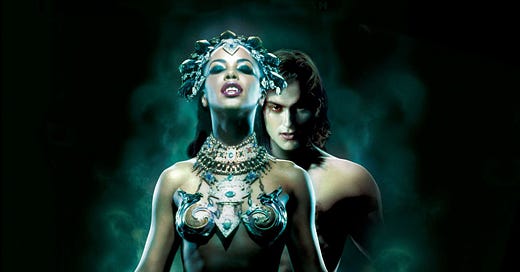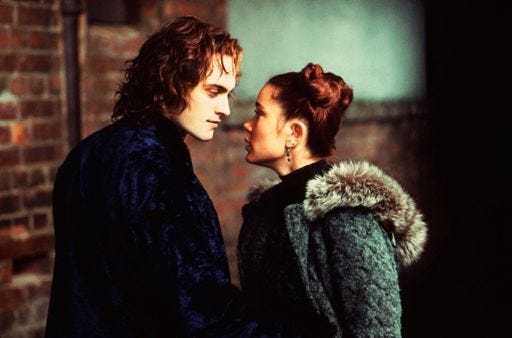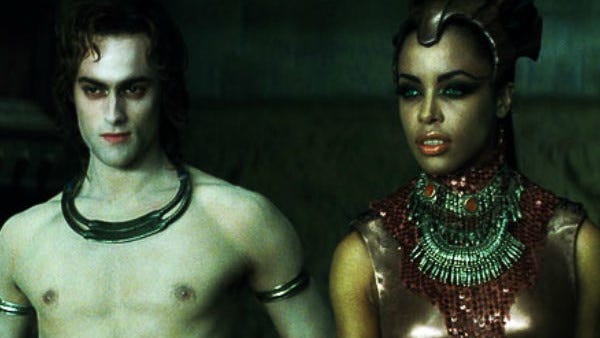I can't stop thinking about Queen of the Damned
It's a bonus newsletter! A bonus newsletter for YOU!
While I’m going to mostly stick with a twice-weekly posting schedule, occasionally the urge might hit me do some dumb shit like write 2,700 words (sweet Jesus!!) on a 20 year-old movie no one cares about. So here it is.
I judge people’s “worst movie I’ve ever seen” choices far more than their best. If you choose something harmlessly mediocre, like The Rise of Skywalker, I’ll just assume you’ve only seen that and The Godfather. Choosing a movie like, say, Sharknado is even lazier, because none of the movies in that series were ever made to be taken seriously. It’s like saying a gas station hot dog is the worst meal you’ve ever had – I mean, what did you expect? It takes some thought and measured comparison. It must be applied to a movie that desperately wanted to be perceived as “good,” even “great,” and then failed on every single count, where you suspect that even the food served in the commissary while filming was loaded with salmonella.
For over the past decade, my worst movie I’ve ever seen is Neil LaBute’s remake of The Wicker Man. While I certainly enjoy the many memes spawned from it, it is my textbook definition of a movie that fails in every possible way. The playful, cheeky tone of the original is gutted in favor of something dour and humorless. The enhanced horror could have saved it, if it wasn’t done so poorly. It features what is easily Nicolas Cage’s worst performance, and this was before he did a long stretch of direct to DVD/streaming movies in which his hairpiece did most of the heavy lifting. Meanwhile, every other actor, either unwilling or unable to go toe to toe with Cage, sleepwalks through their roles, playing it all very seriously, even when Cage is screaming about bees getting in his eyes.
The most pressing, unforgivable issue is that LaBute took a folk horror classic and turned it into more of his signature Neil LaBute misogynist bullshit, in which Summersisle is now a matriarchal society in which the women are duplicitous monsters who enslave and even kill men in service of their community. One suspects that when Cage slugs a woman dead in the face during the climax of the film, the audience is supposed to cheer.
So yes, for a very long time (over ten years!), The Wicker Man was the worst movie I’ve ever seen. Then, I watched Queen of the Damned, and my world is shaken.
The funny thing is that I’ve seen Queen of the Damned before, a couple years after it came out. I remembered the same two things that everyone remembers about it, (a) the glaring lack of Tom Cruise, and (b) the fact that Aaliyah is in it much less than the trailers would have you believe. Nothing at the time stood out about it from any of the other hundred or so forgettable vampire movies I had watched by that point. Then I watched it again this past weekend as part of a group watch with friends, and its flaws (which in this case is every single thing that occurs from beginning to end) became far more noticeable.
Have I just gotten more critical and difficult to please in my old age? Quite the contrary: I think I’ve actually become more accepting of less than perfect movies, judging them largely on if I still find them entertaining. If anything, I’m even more forgiving of vampire movies, because there’s a certain level of expectation that they’re going to be poorly acted, or unintentionally campy, but as long as I come away from them feeling like I had a good time, then it was worth my time.
Queen of the Damned, while definitely poorly acted, isn’t unintentionally campy. In fact, it’s trying very hard to be campy, but in a way that feels like it was written by people (in this case Scott Abbott and Michael Petroni) who are making fun of the source material. Compare this to Neil Jordan’s adaptation of Interview With the Vampire, which was very campy, but in a way that doesn’t feel forced and deliberate. I hope this makes more sense to read than it does to write.
Tone is far from this movie’s only problem, however. Among the many, many mistakes that were made was trying to condense two of Anne Rice’s books in her beloved Vampire Chronicles series, The Vampire Lestat (560 pages) and The Queen of the Damned (480 pages) into a single one hour and forty minute long movie. Rice’s novels are popular because of their exhaustive attention to detail, extensive character backstories and elaborate worldbuilding, in which the vampires’ lineages extend all the way back to ancient Egypt. Here, it barely qualifies as a Cliffs Notes version of either novel, where most of the series’ iconic characters are relegated to standing around in the background, with barely any dialogue, while far too much time is devoted to a romantic relationship between two personality voids.
Its second mistake is in not bringing back Tom Cruise, who defied everyone’s expectations in Interview by playing a delightfully over the top, gloriously queer Lestat. Now, it’s entirely possible that Cruise would have turned the role down, but by all accounts the idea was barely even considered. After a long search for a replacement Lestat, in which front runners included Wes Bentley (the weird neighbor kid who waxes poetic over plastic bags in American Beauty), Josh Hartnett, and Heath Ledger, Irish heartthrob Stuart Townsend, making his major film debut, won the role, entirely to the film’s detriment.
To say that Townsend is dead weight here would be unfair to corpses. Whether it’s lack of talent on his part, or lack of direction (and, to be fair, it doesn’t look like much of this movie was “directed”), Townsend’s efforts are restricted solely to standing around in leather pants with no shirt on, and occasionally smirking. He couldn’t spare a drop of charisma if two little girls showed up at his house collecting some for the National Charisma Awareness Foundation. I’d compare him to energy vampire Colin Robinson from What We Do in the Shadows, but at least Colin Robinson has a distinct personality. The only actor who’s worse than Townsend is Marguerite Moreau as Jesse, a paranormal researcher who falls into an entirely manufactured for the movie romance with Lestat. Whenever these two bags of sand are on screen together, the film doesn’t just come to a dead standstill, it almost seems to move backwards.
Worse, it contributes to another mistake, which was whittling co-star Aaliyah’s role as ancient Egyptian vampire Akasha down to almost nothing, a curious choice considering she’s the titular queen of the damned. Following her tragic accidental death at the age of just 22, shortly after she completed filming her role in the film, promotional materials for Queen of the Damned prominently featured Aaliyah, giving audiences the impression that she was Townsend’s co-star, rather than a barely supporting character. It’s nearly halfway through the movie before she even shows up, and her total screen time is barely fifteen minutes. Now, granted, she wasn’t the strongest actor either, but she’s trying, and she has charisma to spare, only further emphasizing what bottomless black holes of charm Townsend and Moreau are. More importantly, she looks like she was having a good time, which when you see this movie, you wonder why anyone even attempted to take it seriously.
The script retains one (1) plot point from The Vampire Lestat, in that Lestat, asleep for decades in a tomb, is awakened by modern music (“modern” in this case being 1985, when the book was published) that’s described only as “rock ‘n’ roll.” In the movie it’s 2001 or thereabouts, and the music is…oh god. No. Please, no. It’s nu metal, the scourge of the airwaves for far too long. Save for Deftones “Change (in the House of Flies),” a solid single that would work great on the soundtrack for a vampire movie (just not this one), Queen of the Damned’s soundtrack is a real Murderer’s Row of 27 year-old men complaining that the world doesn’t understand them, including Disturbed, Static-X, Linkin Park, and Papa Roach. This is the music that gets the blood flowing in Lestat’s veins again, puts the pep back in his step and brings him bursting back to life.
After Lestat is so taken with this “rock ‘n’ roll music” that he immediately decides to join a band, Jonathan Davis of KoRn (sorry, I cannot and will not learn how to do a backwards R on this thing) dubs his vocals, and the idea of Davis’s signature incomprehensible growl-shrieking coming out of Townsend’s wee bird chest is the closest this movie gets to entertaining (while still far missing the mark). Lestat tells the band right away that he’s a vampire, which they greet with a nonplussed indifference that the audience is supposed to interpret as “these kids today, they’re just so jaded,” but comes off as if they’re not entirely sure what a vampire is. What they do know is that it makes for great PR, and they begin promoting themselves entirely on that (which is good, because their music stinks on ice). “How would you sum up your music?” a reporter asks, to which one member responds “Sex, blood and rock ‘n’ roll.” Incredibly, not only does the audience not respond to this by throwing rotten produce at them, they’re instantly propelled into stardom.
While in the book Lestat reflects on his past, expressing guilt for having turned young Claudia into a vampire, and pining for Louis, the love of his life, here neither of those characters are even mentioned. Now, newly hetero Lestat mostly just enjoys the carefree life of a rock star, living in a mansion that appears to be furnished with only two enormous leopard print couches, draining the occasional groupie, and giving interviews in which he continuously talks about being a vampire, which everyone treats with “oh sure, we’ve heard that one before” bemusement at best. No one bothers looking into it, or finding out anything about Lestat’s background, even though it’s the 2000s and everyone has access to the internet.
Watching Lestat’s rise to worldwide fame (presumably with the sound off) is the Talamasca, a paranormal research group who’s well aware that he’s telling the truth about what he is. One of the members is the previously mentioned Jesse, who, after reading one passage out of Lestat’s old diary in which he expresses vague regret over having to kill a young woman he meets on a beach in the 1700s, instantly decides that not only is she in love with Lestat, but that she wants to be a vampire too. This plot point is not developed so much as it’s dropped in the audience’s lap: in one scene she reads the diary, and when next we see her she’s flying off to London dressed like a club kid to meet him, and they’re making eyes at each other. Moreau’s droning narration during these scenes does nothing to diminish the suggestion that some pages were lost when the original script was photocopied, and no one bothered to look for them.
Aaliyah as Akasha finally makes her first appearance around this point, awakened after a centuries long slumber by Lestat’s music, and not, incredibly, to tell him to turn that shit down. Akasha decides that Lestat is destined to be the king to her queen, and together they’ll rule the world, which means now we have two women who are inexplicably ga-ga for this dork doing Brandon Lee in The Crow cosplay. Meanwhile, another group of ancient vampires, all of whom have names in the book but you wouldn’t know it here, are both dismayed at Akasha’s return, and the fact that Lestat is taking a very public “look at me, I’m a vampire, suck my dick” approach to being a vampire. There’s some nonsense about Akasha putting Lestat under a spell and ordering him to kill Jesse when the other vampires refuse to join Akasha in taking over the world. However, love(?) saves the day when Lestat drinks some of Jesse’s blood and snaps out of the spell, joining the other vampires to defeat Akasha.
Like almost everything that happens in this movie, I question what Jesse and Lestat are supposed to be feeling for each other, because at this point they’ve only had a couple relatively brief scenes together, and don’t generate enough heat between them to toast a marshmallow. They’re like a couple of long lost cousins awkwardly forced to chat at a family reunion. But sure, if we’re supposed to believe that these limited encounters have resulted in a love so powerful it can defeat an ancient goddess, the very first vampire in all of history, I’ll take your word for it. Either way, I can’t say the imagery of a bunch of pasty white people piling up on a Black woman (even if she’s supposed to be eeeeevil) to destroy her is super great, but what do I know, I’m a pasty white people myself.
Anyway, the movie ends with Lestat and Jesse, now a vampire as she’s always wanted to be (I guess??), on the way to spending eternity together, and honestly who could give a shit.
I’ve already wasted far too much time and precious words on Queen of the Damned, and I haven’t even touched on the Hot Topic costumes, the Baby Jane “pale” makeup everyone wears (except Aaliyah, thank god), the wigs, the SyFy channel quality “superhuman speed” effects, Lestat being told with a straight face that as a nu metal singer he’s “bigger than Elvis,” or the fact that Vincent Perez, as Lestat’s sire Marius, wears a vampire teeth appliance that’s so poorly fitted he can’t close his mouth around it. Talking about this movie is like playing Whack-a-Mole, in that you mention one dumb thing about it, and then suddenly remember another dumb thing immediately after that.
I won’t make an argument that Anne Rice’s books should be held in the same regard as, say, The Brothers Karamazov. But they are deeply entertaining reads, written by someone who put a lot of effort and time into creating vivid settings and complicated (sometimes far more than they needed to be) plots, and who clearly cared about each and every one of her characters. That effort and care is reflected in Neil Jordan’s version of Interview With the Vampire, which, while not a perfect film, at least feels true to Rice’s vision. Queen of the Damned feels exactly like what it was, a rush job before Warner Bros. lost the rights to adapt Rice’s work, bafflingly capitalizing on the popularity of nu metal, even though nu metal’s core audience consisted of young white men who probably weren’t reading baroque, homoerotic novels about ancient vampires.
Now let me be clear, none of this makes The Wicker Man a better movie by comparison. It’s still a deeply unpleasant, misogynistic film that seems intent on rejecting everything that made the original special. That being said, it is distinctly a horror movie – granted, not a successful horror movie, but at least it’s clear what it’s trying to be. Queen of the Damned, while categorically a vampire movie (in that vampires are in it), fails on even that level. It’s not scary, it’s not sexy (unless you find people sniffing at each other like dogs sniffing a bag full of Beggin’ Strips sexy), and it definitely doesn’t make being a vampire seem enticing. Who’d want to be stuck hanging out for eternity with these people, listening to that music?
And, at the very least, the image of Nicolas Cage screaming “Not the bees!” has become an indelible, even beloved part of pop culture history, making the experience of watching The Wicker Man almost worth it. Queen of the Damned rewards you with nothing for your trouble. It’s a blank, large handfuls of money flushed down the toilet, without even a single meme-worthy image or line of dialogue left in its wake. For that, I think, it takes over as the worst movie I’ve ever seen. Congrats, Lestat, at least you managed to be the king of something.








Wel in my most modest opinion, I liked this movie, maybe some of the roles played didn’t get done justice but the soundtrack was killer! In this very bleak day and time “2024” there isn’t many movies and definitely not any good music at all, we all could stand a change for the better maybe some day soon we or should I say I might have some of these prayers possibly answered?